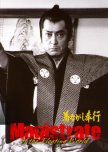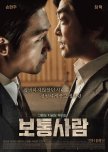
Mao Da Bing is a water delivery boy and in a rush on his bike to make a movie’s showing. He accidentally knocks over some bricks and a young woman clocks him upside the head with a brick and then destroys his bike. At the police station she hands him her keys and tells him to feed her fish by writing on a piece of paper. When he enters her apartment, he sees that it is an ode to film and especially Street Angel with actress Xiao Xuan. He finds her diary and begins to read about her life and how she ended up where she is. As he reads her story, Da Bing also discovers they share a childhood connection.
The flashbacks to Ling Ling and Da Bing’s childhood were sweet and an innocent exploration of friendship and films. Before and after this segment was not as entertaining and contained one too many melodramatic and coincidental moments for me. As a cinephile I can understand the children’s love of film and the role it played before television took over. What I didn’t understand were some of the mom’s inconsistent decisions later in the story. Another mystery for me is what kind of job did Ling Ling have to be able to outfit her apartment like a mini-cinema? Da Bing could barely afford to go to the movies as an adult. They suffered similar situations and Ling Ling’s was compounded by hearing loss.
As much as I wanted to love this film about loving films, outside of the children’s story, the film suffered from too many coincidences and underdeveloped character elements. However, if you can overlook some of those flaws there is still much to be enjoyed in this film about childhood friendship, family, and reconciliation aided by the numerous clips of old Chinese films.
19 August 2024
Was this review helpful to you?

This review may contain spoilers
"Once you join a family, you have to pitch in, right?"
Voice of Silence was an amalgam of different genres with results as mixed as the narrative moods. Shots of bucolic farm land and cornflower blue skies camouflaged empty buildings hiding dark, deadly secrets. The acting and cinematography were excellent, I just can’t say that I thoroughly enjoyed what was supposed to be a heartwarming story of a child in jeopardy.Chang Bok and Kim Tae In both have physical disabilities. Chang Bok walks with a significant limp and Tae In is mute. They live amongst beautiful farmland in peasant shacks selling chicken eggs at the market. In their spare time they clean up crime scenes for a gang. They know where all the bodies are buried because they buried them. Things go sidewise when their boss tells them to take care of a little girl who has been kidnapped. Because the kidnappers accidentally grabbed Cho Hee instead of her brother, the father has been haggling with them, unwilling to pay much for her. Tae In takes her home to his small squalid place he shares with his little sister. Cho Hee befriends Moon Ju and helps to civilize the almost feral girl. Chang Bok takes Cho Hee on their jobs and the child scarcely bats an eye at the bloody business. The more her father holds out the more danger the little girl is in even from her well-meaning caretakers.
It felt like I was supposed to become invested in Tae In and Cho Hee’s relationship as the two seemed to bond. In truth, the only characters I cared about were Cho Hee and Moon Ju. Chang Bok and Tae In may have cared about her to a degree but were also willing to hand her over to child/organ traffickers. Unlike church going Chang Bok, Tae In’s moral compass began to point toward protecting Cho Hee. Yet Tae In was still a criminal. When a police officer investigated Tae In’s property, I was hoping she would find the girl, she certainly didn’t deserve what happened to her.
The most fascinating character to me was Cho Hee. What kind of family did she come from that burying a body and bloody scenes didn’t affect her? The film never told us. At every crisis she processed the information and pinned a placid expression on her face. Regardless of any sympathy she felt toward Tae In she was smart enough to realize how precarious her situation was with the two inept criminals surrounded by sharks. Her family might have been reluctant to have her returned but her fate was a terrible end the longer she stayed where she was.
I’m quite sensitive to child in jeopardy films and despite Tae In having a good heart working at a bad job, Cho Hee was in danger. "Once you join a family, you have to pitch in, right?" Just because they made the child an honorary family member while she was a prisoner didn’t mean that what was planned for her was any less heinous. It didn’t help that the film ended as if the writers ran out of paper when typing out the script and decided they’d gone far enough. Open endings are my least favorite and always feel lazy to me like the writer didn’t want to commit to an ending for fear of angering some part of the audience.
Voice of Silence did not fit neatly into any category. Was it a crime drama? There were plenty of bodies. A comedy? Maybe, I laughed once. Social Commentary? The two inept criminals did seem to be forced to work for the gang due to financial hardships in the rural area. Strange Criminal Slice of Life Buddy film? Probably the closest fit. Mostly, the message that came across was that one day you’re hanging someone on a meat hook, the next day it might be you.
16 August 2024
Was this review helpful to you?

"In front of your eyes"
Director Naomi Kawase reflected on different women who were True Mothers in this sensitively told story about adoptive and birth mothers. She also showed how some mothers are mothers in name only while others who have no children of their own nurture those in their care with compassion.Satoko and Kiyokazu find they are unable to conceive a child. When they see a service that connects mothers who can’t raise their child with mothers who want to raise a child, they contact Baby Baton. Hikari is a 14-year-old girl who becomes pregnant and discovers the fact one week too late to have an abortion. Her embarrassed and enraged mother sends her to Baby Baton to keep the news secret. Satoko and Hikari are destined to be connected in the past and future as their decisions change their lives.
Kawase had a solid story to tell, but it oftentimes drifted off into side stories or came across almost like a documentary told in non-linear style. The viewer followed Satoko and Kiyokazu as they traversed the emotionally and physically demanding road of infertility treatments and then through the arduous path to adoption. Teenaged Hikari went from being in love to being pregnant and emotionally abandoned by everyone she cared about. Kawase’s attention to detail was her strength and weakness. While gaining insight into the different people involved was important, I didn’t need to know everything that happened to every character in order to feel emotionally connected to them. At nearly 2 ½ hours, some of the more disparate stories could have been more judiciously edited.
The primary actors did a fine job. Iura Arata as the loving husband conveyed Kiyokazu’s grief at being unable to father a child. Kiyokazu’s raw drunken confession to a shocked friend revealed the depth of his despair. He was the lone male in this melodrama aside from Hiraki’s boyfriend who walked away without any consequences. But this film truly belonged to the women. Nagasaku Hiromi brought Satoko’s desire to have a child, protective maternal instincts, and generosity to life. Mikita Aju had the difficult task of playing Hikari from innocent teenager in love, to bearing the consequences alone not only before childbirth but afterwards as well. Her performance felt honest as the girl who wore the “In front of your eyes” T-shirt and feared being erased. I would have liked her story even more if Hiraki would have verbally shared how she felt about the pain of giving up the child she wanted as she aged and her feelings of desertion when her own mother so easily gave her up. Lastly, Asada Miyoko shined as the childless director of Baby Baton who nurtured the girls from different walks of life at her idyllic facility. Her compassion made a perfect contrast to Hikari’s cold mother demonstrating that being a mother doesn’t require a common DNA.
I wasn’t a fan of the overly blown out photography Kawase used. The continued bright gauzy effect began to strain my eyes. Normally, shots of architecture or natural scenery appeal to me, but many of her transition shots looked awkward and disconnected from the story instead of symbolic. I enjoyed the film's concept and acting, but the almost documentary style for much of the film sterilized the feelings it might have evoked otherwise. Despite my reservations this was a thoughtful meditation on the different expressions of motherhood. The topics and characters were broached in a respectful and empathetic manner that highlighted the sacrifices and dedication parenthood entails.
15 August 2024
Was this review helpful to you?

"They'll tire of it, they're just women"
Cart was loosely based on the 2007 E-Land strike that went on for 510 days. Workers were striking against the corporation abusing irregular workers, not promoting them to regular work, not paying for overtime and most egregiously, a whole sale firing of workers for cheaper alternatives and to avoid promoting workers under the Irregular Employment Protection Act of 2006. Most of the irregular workers were women over the age of 30. Cart focused on women fighting not only for their jobs but their dignity and fair pay.Han Sun Hee was close to being promoted to regular employee at the store after five long years. With a husband who traveled to find construction work, a teenage son and young daughter, her income was vital to the family. Lee Hye Mi was a single mother of a little boy and needed the job but refused to work unpaid overtime. One day everyone received a text message stating their contracts would no longer be honored. Hye Mi and older cleaner Kang Sun Rye gathered everyone to form a union and asked Sun Hee to help them lead it. Management refused to meet with the women, viewing them as “whining” and that there was nothing to worry about because, “They’ll tire of it. They’re just women.” Upper management couldn’t see what the problem was because the low pay was considered “pocket change” to them. The women were viewed as disposable and less than human. When the workers went on strike, the company played hardball utilizing brutal enforcers and police riot squads.
Cart had a strong cast. Yeom Jung Ah and Moon Jung Hee as cashiers, labor leaders, and Unnies gave heartfelt performances. Kim Kang Woo as assistant manager and labor leader Dong Jun added the one positive male portrayal. The story seemed unfocused at times and when an older lady told a speaker to put what he was saying in simple language, I repeated, “What she said!” Because I wasn’t familiar with the abusive working conditions and E-Land strike I ended up hitting Wikipedia to fill in the gaps. There were also events the writer failed to explain exactly what happened and it could feel like pieces of story were taped together with no connective material.
In my own country I’ve seen how people fighting to be seen, to be treated fairly, and paid fairly can run up against the wall of political or corporate bureaucracy. Goliath has the money and resources for long, drawn out fights. In the film, the women not only had to face a huge corporation, they failed to garner public support even after jackbooted enforcers pummeled them and tore down their encampments. Large corporations often have an easier time gaining the ear of reporters than disgruntled ahjummas. But when the chips are down, my money will always be on the fierceness of ahjummas, especially ahjummas willing to battle for 510 days to secure better and more fair employment.
7 August 2024
Was this review helpful to you?

Simply wonderful
Ann Hui took a subject that could have been melodramatic and maudlin and handled it with subtlety and quiet grace. A Simple Life gave a glimpse into Hong Kong nursing homes and the challenges of caring for and taking care of the elderly. Andy Lau and Deanie Ip had a beautiful chemistry as boss/surrogate son and maid/surrogate mom.Ah Tao has been serving the Leung family for 60 years going back to the Leung grandmother matriarch. She continues to work for Roger, the Leung son residing in Hong Kong-cooking, cleaning, and even nursing him after a heart attack. Roger is a film producer who often travels for his job yet he always knows an exquisite meal and sympathetic ear will be waiting for him when he returns home. On his latest trip Ah Tao has a stroke. Unwilling to be a burden she retires and decides to enter a nursing home. Roger checks the place out and tells her he will be visiting her. Unlike the sons of other residents, he keeps his word.
Ah Tao had always taken pride in serving Roger and his family. The role of being provided for was an unfamiliar and uncomfortable one. Though she often refused money, the sight of Roger visiting caused her eyes to light up. During the first scene of the film no words passed between them as Roger ate, now when he arrived, they ate together, laughed, and enjoyed each other’s company. Never ashamed of her, he called her his aunt when she accompanied him to a movie premiere.
The view into the nursing home was difficult. Ah Tao’s room was little more than a cubicle with a curtain for a door. She was around people in varying states from vegetative, with dementia, or still quite mobile. As people came and went, she knew one day she too would leave and not come back. Death was no stranger to the home. Ah Tao was feisty and generous, not letting anyone put her down. Even as her body deteriorated, her spirit soared. Though Roger doted on her, he never fussed over her, giving her the space and dignity she required. Deannie Ip gave a wonderfully complex performance as Ah Tao dealt with her health issues, adapted to life in the nursing home, and the change in her relationship with Roger. Lau’s Roger calmly accepted his role of caregiver without complaint as his character showed how much the older woman had come to mean to him.
Director Hui could have taken the easy path and attempted to manipulate the audience’s feelings. There was no hysterical crying or deep soul wrenching conversations. Instead, she portrayed Ah Tao’s health and future matter of factly. No evil nursing home personnel or family members tried to take advantage of her or come between her and Roger. Instead, the film focused on the universal challenges of growing older-facing deteriorating health, the financial and emotional costs, and how different families reacted to those challenges. In this slice of life, Ah Tao and Roger effortlessly displayed the ease of two people who loved and respected each other. At 2 hours the slow, character driven story might have been too long in someone else’s hands, but Ann Hui allowed her actors to shine as their characters showed the importance of loyalty and devotion especially in the difficult times in this touching film.
5 August 2024
Was this review helpful to you?

"I like cleanliness, and I have a strong sense of duty"
Magistrate of the Floating World aka The Magistrate Who Dresses Informally was an entertaining made for TV movie with an overly complicated plot. The best thing about it? Nakadai Tatsuya and his beautiful crazy eyes having a good time in a more comedic role for a change.After three magistrates break down and quit or attempt seppuku in one year, the powers that be in Edo decide that they have run out of options and must send the eccentric Mochizuki Koheita to clean a town up. Mochizuki sends a spy ahead to tell people that he is better at “having fun” than his skills as a samurai are. In reality, he actually is a remorseless womanizer, but also a master with the sword. He never checks in with the magistrate’s office, much to the consternation of the official and scribe working there. Instead, he makes himself at home in Horisoto, the den of iniquity openly run by “samurai losers” and clandestinely by high-ranking officials who make a tidy profit on the illegal activities. The spies, corruption, traitors, and temptations make Mochizuki’s job challenging, but the laid-back magistrate takes it all in stride.
The story was based on a book which might explain the large number of characters and intrigues. Ninety minutes was scarcely time to do many of the stories and characters justice. Nakadai was the focal point as he sauntered about unarmed for most of the movie, making friends as he drank, gambled, and slept his way to discovering who was the power behind the criminal enterprise. The office duo’s continued annoyance at his unexplained absence also provided some levity as they cluelessly complained while Mochizuki quietly cleaned up the deeply imbedded criminal element.
Magistrate of the Floating World was directed by Okamoto Kihachi, who directed many big screen films. With the star power of Nakadai Tatsuya it did feel at times like something grander than a TV special though something from the 1960’s. The large number of characters briefly introduced and used even when integral to the story could make it hard to keep up with who was important and who was irrelevant. Having said all that, I did enjoy it as a Nakadai fan. If you like old samurai movies or Nakadai Tatsuya in particular, this is something to give a try.
17 July 2024
Was this review helpful to you?

"A tiger's daughter is no kitten indeed"
Lady Detective Shadow was a low budget Dragon Gate Inn adjacent movie. The fights, story, and sets were the equivalent of a mediocre Cdrama. What it did have going for it was a competent female lead, a former royal constable, ousted by an evil, powerful eunuch during the chaotic times of the Ming Dynasty.Sima Fei Yan and her sidekick Yezi head to Shacheng in search of the bandit Lu Jiang. Lu Jiang and numerous sects and bandits are headed there in search of the mysterious treasure that reveals itself every 49 years in the desert. Everyone converges on a rundown inn where death is a familiar guest. Official Song and his servants wind up in pieces out in the woods giving Fei Yan another case to solve. Helping her is the local official, Wu Ping, a friend of her late father.
This film had an adequate story and acting though the logic during the final quarter of the film fell apart. The fights were shot for people with no kung fu skills with lots of obvious cuts, sped up and slowed down action, and wire work. The bare minimum was put into the sets and CGI. Shang Rong did her best with the Sherlockian, unemotional role of the brilliant detective.
If you have nothing else to watch except for this film, it’s not an awful way to spend 90 minutes if you keep your expectations as low as a buried city in the desert.
15 July 2024
Was this review helpful to you?

"No one can beat me"
Dorian “Flash Legs” Tan and Don Wong teamed up to take on an evil counterfeiter in Hot, Cool, and Vicious. This Taiwanese kung fu flick surpassed my expectations, albeit they were very low to begin with. Not gifted with the budget of a Shaw Brothers production, director Lee Tso Nam and martial arts director Gam Ming made the most of what they had, namely Dorian Tan’s excellent kicks.Capt. (Northern Leg) Lu takes care of the law and order in a village run by Mayor Yuen. When Yuen’s son commits a murder the two men clash. Southern Fist Pai Yu Ching, a known killer, arrives in town with his buddy Tieh and begins working for Yuen. Newly arrived Miss Lee and her uncle bear a grudge against Lu. Before long everyone seems to be trying to hire Pai to kill Lu.
There were no secret lists or manuals, but there were plenty of hidden identities and subterfuge. The plot led to the fights nicely. Gam Ming’s choreography utilized the cast’s abilities and those with lesser abilities well. Speaking of Gam Ming (aka Tommy Lee), he showed up in the final act as the dangerous golden haired albino fighter. Dorian’s kicks are always a joy to watch and the choreography showed them off splendidly. There was a modicum of wire-fu when characters did some high jumping but it was kept to a minimum. Sun Chia Lin even got in on the fighting. Most of the action was fairly fast though there were some glaring misses. The final fight was worth the price of admission.
Dorian Tan and Don Wong made for a fun dynamic duo as they took on Gam Ming and a host of minions led by Phillip Ko Fei, Li Chiang, and Lung Fong. If you enjoy old kung fu movies, especially the low budget Taiwanese flicks, this is one to try.
10 July 2024
Was this review helpful to you?

"It ends fast if you stay still"
What will an Ordinary Person do in the face of poverty and corruption? Will an Ordinary Person fight for the children’s future at the cost of his own? What would an Ordinary Person do for his child’s health and future? Set in Seoul during the turbulent 1980’s, two ordinary men would have to decide how much of themselves they could give away and whether they could do something extraordinary.Kang Sung Jin is a police detective barely making ends meet with a mute wife and a son who needs an operation on his leg. Providence seems to reach out and touch him when Choi Kyoo Nam of the Intelligence Agency gifts him an envelope containing evidence of a serial killer. The killer just happens to be in Sung Jin’s jail cell. It’s up to Sung and his partner to gather the witnesses and coerce a confession from Kim Tae Sung. It’s not long before his friend and reporter Chu Jae Jin, points out conflicting evidence putting Sung Jin in not only an ethical dilemma but both men in a life and death one.
The events in the movie lead up to the 1987 Defense of the Constitution and demonstrations. Torture and forced confessions were business as usual. Jang Hyuk’s Choi Kyoo Nam was ruthless and saw those beneath him as mere dogs which he could order to do his bidding. If they faltered, he would just make dog stew out of them. The Intelligence Agency had its tendrils everywhere.
Ordinary Man forced its characters to dig deep and make diligent and dangerous decisions. Like in an old Kaiju movie, the monster didn’t truly reveal himself until the forty-minute mark. The film could have used some trimming to narrow down the story and focus. It started out with a comedic chase, but anyone who has watched Korean movies knows better than to take that bait, it’s never long before the pain sets in.
Sung Jin found that once you did the devil’s bidding, there was no turning back. A new car, money to spend, an operation for his son all seemed like a dream come true until it became a nightmare of agonizing ethical choices. Choices had consequences, terrible irrevocable consequences. This was not an action movie, and only the framework had to do with the pervasive corruption in society. At its heart, the film asked what would an ordinary man do when faced with dire moral challenges never knowing if his choices would change anything for the better or if he’d be able to live with them.
"If I don't fall, no one can knock me down."
5 July 2024
Was this review helpful to you?

"Your kung fu is good but you can't stop bullets"
Deadly Confrontation was a below average Taiwanese kung fu flick with low wattage star power. Chia Ling, Lo Lieh, and Yueh Hua had top billing but the actual leads in the movie were Liang Hsiu Shen and Pai Ying.Mah returns home after three years in jail. He had been framed by his enemy Sung Teng Wai, the local warlord. While he was away his girl married Sung’s son. Hot headed Mah has nothing but revenge on his mind. Sung has no intention of letting Mah live long enough to reach that goal. Chow Sun arrives in town looking for a job and after beating most of Sung’s men is put in charge of the casino. Mah and his friends find themselves up against formidable forces, especially when it turns out Sung is also processing opium on the side!
Everything about this film was below average with a less than charismatic cast. Liang and Pai were adequate but didn’t command attention. Chia Ling had very little to do and was finally rewarded with one fight. Lo Lieh popped in to fight with Pai Ying. Finally, Yueh Hua showed up near the end of the film as another bad guy. The fights were okay. Guns were also used, something I don’t care for in martial arts films. The editing was abysmal. People who were about to be killed showed up later without a scratch on them. I don’t count off for cropped edges and wear and tear on the film, but it could be distracting. Typical of Taiwanese films from this era, much of the fighting took place out in nature.
This kind of film is the hardest to write a review on because it was so bland and poorly put together. Deadly Confrontations was far from the worst old kung fu film I’ve watched but far from the best as well.
27 June 2024
Was this review helpful to you?

"Oh how lovely, oh how sweet"
Pieces of Memories was a whimsical and touching look at how memories shape our perception of life. Ku Hye Sun perhaps best known for playing Jan Di in Boys Over Flowers wrote and directed this short film. I read she also wrote the music for the haunting song that played throughout the film.The film begins with an older man lamenting that his future is uncertain. He has tried to conduct his life, but found that not everything could be controlled. As he sits down at the piano, a portrait comes to life to direct the music and memories displayed. Time rewinds and his life is shown through his years at the keyboard.
What comforts us in difficult times and as our life draws to a close are the cherished memories of loved ones. While we cannot control much of what happens in life, we can control how we frame those thoughts. Love lives on and the sweetness of it enriches the moments that pass and heals the losses we suffer.
Ku’s music was both melancholy and uplifting, much like this short film. It reminded us that even when we haven’t visited our memories for some time, they are still waiting on us like old friends. This short film was an inspiration to live life to the fullest and to take every opportunity to make sweet memories.
“Our moments together
Days we share together
Now melt down in my teary eyes
Hurting, dampening, distancing
O how lovely, O how sweet
My immortal love that you are”
19 June 2024
Was this review helpful to you?

Clucking good!
Chef Baek Jong Won returned, this time to guide us through Korea’s obsession with the beloved yard bird on Chicken Rhapsody aka Korean Fried Chicken Rhapsody. With streets named after area specialties and fried chicken restaurants seemingly everywhere, the Koreans take chicken very seriously combining tradition with innovation in order to create nearly limitless variations to delight and challenge their taste buds.Despite Netflix’s title, only the first episode focused on fried chicken. Baek and his guests did a deep dive into the history of fried chicken and the major turning points for the popular dish. Fried chicken took off in the 1970’s as chickens and cooking oil became more readily available. The initial restaurants were influenced by American fried chicken but it didn’t take long for the Koreans to say, “hold my beer” and put their own delicious spin on the dish with a wide variety of sauces for the juicy and crispy chicken pieces to be tossed in. I did love the trivia bit regarding Kentucky Fried Chicken’s introduction in the 1980’s. Not only did the American chain show the benefits of brining, but it was also popular with women of all ages because they could finally order chicken legs for themselves which were often gobbled up by the men in their lives when meals eaten elsewhere only came with two.
Episode 2 explored other dishes, such as rotisserie and barbecued chicken. Baeksuk, Sujeunggye, Spicy Stir-fried Chicken, and Cauldron Lid Spicy Braised Chicken all had their moments of attention. None of the bird goes to waste as cooks through the years have developed new ways of serving offal in addition to the more favored parts. The show also discussed the efforts to restore native birds, including the long-tailed chicken.
With over 40,000 fried chicken shops, it's safe to say that Koreans love the crispy delights. And why wouldn’t they? Whether it’s for dinner, celebrating, or winding down with co-workers at the end of the week, they eat around one billion chickens a year. There are streets throughout market districts named after the specialty dish served to happy customers from Braised Chicken Street to Chicken Feet St! Fried, braised, stir-fried or cooked on a cauldron lid over a fire, there was no shortage of styles. Too hot for chicken soup? There is no such thing! The hotter the day the more bowls of scalding soup that are sold!
If you’ve ever watched a Kdrama with the characters eating fried chicken and wondered what went into making the tasty morsels, look no further. Baek and friends not only showed the different methods used, but the history and how cooks create their own unique and mouthwatering styles of preparing the popular bird. Per usual, this series produced a quality program showing the love and imagination that goes into preparing both traditional and cutting edge cuisine.
15 June 2024
Was this review helpful to you?

"Better to be broken jade than cheap tile intact"
This forty-one minute film fragment managed to fit in lots of Greedy Neighbors. This was one of director Ren Peng Nian’s early films which also starred his wife, Wu Li Zhu. Originally, the film was around 100 hundred minutes, but enough frames survived to get the gist of the story.Hua Ren inherited his considerable wealth which includes prosperous farmlands. His wife, Guo Fen, is the daughter of a famous fighter, which will come into play later in the movie. She and his sister Si Wen try to keep things running smoothly as Hua tends to spend money frivolously. The local warlord, Wild Dog, decides it’s time to bully his neighbor into giving him his farmlands. Another scoundrel, Smiling Tiger, also has his sights set on fleecing the wealthy fool. Smiling Tiger convinces Hua Ren to take his sister, Zhi Hua, as his second wife. Zhi Hua quickly mesmerizes Hua Ren and drives a wedge between him and his sensible first wife and sister. Having fallen into the clutches of Wild Dog and Smiling Tiger, the clueless Hua Ren is in for some challenging times.
Hua Ren was not a sympathetic character. I was far more invested in Guo Fen and Si Wen, who coincidentally, were excellent martial artists and protected their own. Perhaps in the longer version of this film they had more time allotted, they certainly deserved it. I’m not sure if Zhi Hua and Smiling Tiger were actually related or if she was a plant because they had a very, uh, tactile relationship.
Once Hua Ren was about to lose everything, his sister and male servant helped to turn things around and galvanize him into action. “Today’s world is run by might…Better to be a broken jade than cheap tile intact.” The events that followed in the last part of the film were confusing as Wild Dog had to be confronted twice with no explanation. Given the mood of the film, it did seem to have a proper ending which is always a concern with film fragments.
If you have an interest in silent films from this era, Greedy Neighbors did give a little insight into the political happenings of the time and the vulnerability of the people. Ren Peng Nian and Wu Li Zhu would go on to make numerous martial arts and wuxia films together, with Wu often cast as a heroine. I’d be interested in seeing some of those. This film was a struggle watching the pampered and easily manipulated Hua Ren letting the important people in his life suffer while he partied. He was lucky enough to have two strong women who had his back or at least tried to. More than he probably deserved.
14 June 2024
Was this review helpful to you?

"Am I a coward?"
Portrait of Madame Yuki was a strange and twisted tale from Mizoguchi Kenji. Ostensibly about male domination, it felt more like a toxic relationship based on S & M.Yuki and her husband live apart most of the time, but have reunited over the death of the family patriarch. All that they have left is the estate she owns. Her husband has a mistress and is a wastrel with money. Yuki and her friend, Professor Kikunaka, decide to open her house as an inn in order for her to make money and become independent. The servants all believe she’s in love with the professor but their relationship always comes across as platonic, though his feelings may run deeper. Her husband isn’t afraid to bring his mistress home or even to force himself on Yuki. Regardless of how badly he humiliates her, Yuki can never tell him no. The professor tries to convince Yuki to divorce her husband, but the “demon” inside her won’t let him go even when he attempts to steal her home out from under her.
The version I watched of this film was difficult to follow at first as whoever/whatever did the translations completely messed up the English pronouns. Yuki was often referred to as him, her, or it. Plural pronouns were also used for singular people interspersed with singular ones in the wrong tense. It took a while to figure out if it was Yuki’s father or her husband’s father who died and whether it was the husband, Yuki, or himself the professor was talking about in a conversation. Other than that annoyance, the story itself was not a pleasant one. Despite the professor encouraging Yuki to be strong and stand up for herself and do the things that would make her life better, Yuki usually collapsed into a heap blubbering about how she was a coward, defeated, and not strong. Ultimately, no matter how badly her husband treated her, she could not resist whatever he did in the bedroom. Instead of embracing this part of herself or cutting ties with her husband, she chose to suffer. She always seemed to be slumped over, most likely because she was lacking a backbone.
This film was beautifully shot both indoors and outdoors. Mizoguchi certainly had an excellent eye for framing scenes. The acting was all very good, Kogure played Yuki as a pathetic creature ruled by her demons, Yanagi gave the husband a twisted sense of resentment toward his wife, and Hamada with her gum snapping duplicitous Ayako rounded out the reluctant ménage à trois. Based on the synopsis, I thought that Hamako would have a bigger role, but she was mostly relegated to the background after Yuki was introduced.
Portrait of Madame Yuki ended up being a depressing look at a woman who felt trapped by societal constraints and her own despised appetites. If you are looking for a tragic film with an open attitude toward sex (1950’s style) and are a fan of Mizoguchi’s work, this might be one to try.
*If suicide is a trigger for you, please do not watch this film. There is a lot of talk about suicide, a suicide attempt, and completion.*
13 June 2024
Was this review helpful to you?

"The more you know, the more you see." I've seen enough.
A Trip with Friends is the third film of Kim Chang Gyun’s that I’ve watched and sadly it was the weakest. All three of his short films were made in 2018 abroad. This movie as well as Snapshot were filmed in Thailand. Like Snapshot, the characters visited various historical sights and tourist attractions.Kim Hee Jung, Seo Mi Jung, and Lee So Jung are theater and film studies majors at university. They decided to take a trip abroad to Thailand together. They eat, shop, and visit the elephants and later talk about the elephants. Over the next few days they take boat tours and go to the beach and visit other sights. They talk ad nauseam about acting and their love lives. Two of the girls have dreams about their professor of Arts in Images class. On the plane ride home, the third girl has her own dream about the professor.
I would worry that this was more of a Kim Chang Gyun Ego Trip rather than A Trip with Friends except that his professor Hur Dong Chul came across as a deadbeat in two of the girls’ dreams. During the dream sequences it became obvious how low budget the film was as there were people in the background yelling and babies crying. Much of the film was watching the girls take selfies together as they explored their surroundings. When they weren’t taking pictures, they were talking in their room, or at least two of them talked, the poor third girl spent most of her time trying to look interested during the mundane conversations. The two girls who did most of the talking also did what I call “hair acting”. They could not keep their hands out of their hair. They were constantly tussling, tossing, and flipping it.
I thought there were elements of Chang's other two films that were of interest, but I found A Trip with Friends tedious at best. I enjoyed seeing some of the places they visited, I just grew tired of watching them taking pictures of themselves. The dreams ended up being a little creepy. And the long, long, monologues about their lives held little interest for me. I don’t mind a bargain basement budget for an independent film, however, I need something to keep my attention. I wished I had stayed home instead of taking A Trip with Friends.
5 June 2024
Was this review helpful to you?

 54
54 188
188 11
11






















